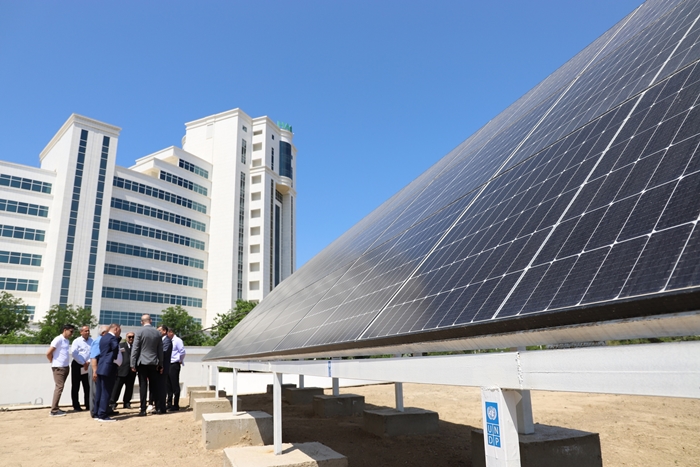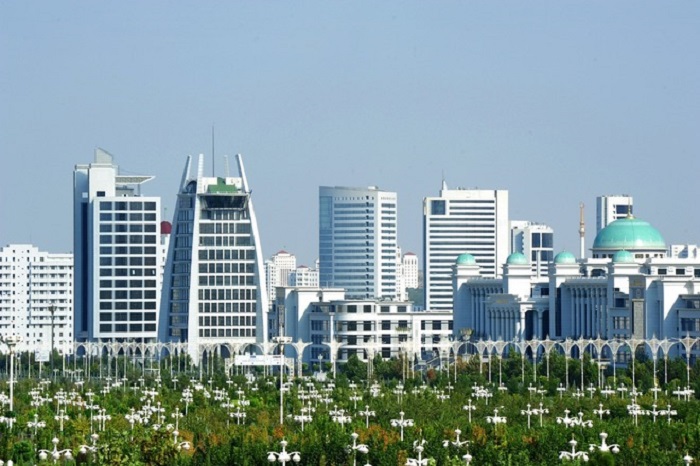The long-term project “Sustainable Cities” of the Ministry of Environment of Turkmenistan and UNDP/GEF, with a large financial base and opportunities, based on the potential of a team of professional environmentalists and energy experts, can be called both climate mitigation, energy efficient, institutional and waste development.
Progress in the implementation of project activities is regularly discussed during meetings of the project council, which includes specialists from the public sector in the fields of construction, motor transport, energy, environment control, as well as representatives of the governorates of Ashgabat and Turkmenbashi involved in the process of greening and sustainable development of urban infrastructure. The Neutral Turkmenistan newspaper writes about one of these meetings.
Project manager Batyr Ballyev explained that measures for energy efficiency, improvement of the environmental monitoring system, waste management, and innovation relate to both institutional frameworks and technical potential: energy-saving lamps have been installed for the street lighting system, waste sorting equipment, energy- and water-saving equipment for Avaza hotels have been provided to pilot project facilities, including the installation of a solar power plant.
Cooperation in the development of the Fourth National Communication of Turkmenistan on Climate Change and the implementation of activities to assess and reduce methane emissions within the framework of Turkmenistan’s Nationally Determined Contribution is also continuing.
Energy efficiency specialist Atamukhammet Saryev said that the regulatory framework of Turkmenistan will soon be supplemented with a new Law “On Energy Saving and Energy Efficiency”. Its adoption is linked to the activation of the “green” agenda in the country.
Environmental monitoring expert Victoria Akopova noted: “Since the beginning of 2022, the laboratory equipment purchased by the project has been undergoing the conformity certification procedure before being sent to the Ashgabat and provincial laboratories of the Ecocontrol Service. The devices are designed to monitor air quality, greenhouse gas emissions, and check vehicles powered by gasoline engines. There were five procurement streams in total, which were accompanied by training sessions.”
According to Akopova, the project together with the Ozone Center of the country is working on the implementation of the first stage of the Kigali Amendment to the Montreal Protocol, which is focused on mandatory certification of refrigeration specialists. The International University of Oil and Gas recently opened a special center.
The coordinator of project activities, Jemal Durdykova, reported on the growth of the project’s collaboration with the private sector in the separate collection of household garbage. Now special containers have now become part of the municipal infrastructure in the capital’s hotel sector and Avaza – “Seýrana”, “Hasyl” and “Balkan”.
In total, 179 tons of plastic, 145 tons of waste paper, 114 tons of glass were collected together with a partner – the Society for the Protection of Nature of Turkmenistan. Plans include the implementation of morphological waste analysis for further submission to statistical bodies, the revision of basic regulatory documents for the sector: classifier and classification codes, criteria for assigning relevant waste to the class of hazardous to ecosystems, national concept, as well as a textbook on EIA – environmental impact assessment, intended for university students studying ecology.
Arslan Zomov, an innovation expert, said that the operation of the power-saving equipment installed at the Hasyl Hotel in Avaza has been monitored for four months. After testing, similar technologies will be implemented at other pilot sites in Avaza.

A faucet nozzle that saves water is an effective way to reduce water consumption in hotels. Mass installation of such nozzles can save a significant amount of water, which is specially cleaned and desalinated for Avaza hotels.
Specific requests are also considered, for example, one of the hotels, which also serves as an experimental base for testing the effectiveness of eco-innovations, is interested in energy-saving devices for outdoor pools illuminated from the inside at night.
Thermal imaging sensors that have been installed are gathering data on the peak summer day’s excess heat, which can be used to determine whether to use blinds in the lobby’s sunny side to block high-temperature emissions or to use more energy to cool the building.
During the meeting, participants also discussed the eco-innovations of the city of Arkadag. As known, ten units of electric buses and electric taxis have arrived in the city experimentally. Some of them run in test mode.
Turkmen designers have gained invaluable experience during the implementation of the smart city project and in the future will continue to enrich their experience during study trips to other countries where there are similar “smart” elements of urban space.
The foreign practices will be adopted taking into account local soil-climatic and seismic conditions. The meeting stressed that interest in such energy-efficient, innovative, “smart” and environmental construction in the country will grow in view of the upcoming implementation of the new large-scale megaproject – “Ashgabad-City”.///nCa, 25 July 2023 [photo credit – UNDP, Neutral Turkmenistan]
#Turkmenistan, #Ashgabat, #Awaza, #sustainable_cities

